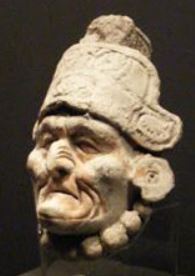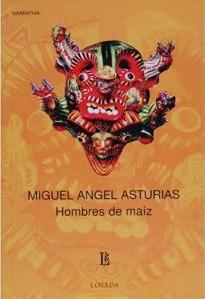Miguel Angel Asturias won the Nobel Prize for Literature in 1967 during my freshman year at college. I must have been chasing girls the day of the announcement. I just don’t remember him. Until a few months ago, I didn’t know who he was.
While doing research on the Cuban Revolution and its leaders for recent blog-posts, Miguel’s name kept popping up here and there in various contexts, so I decided to learn more about the author by trying to take an inside-the-cover peek into his signature book, Men of Maize, on Amazon.com.
Was Asturias really that good that he could win a Nobel prize? What did he write about?
Miguel Angel Asturias, I’d already learned, was born in Guatemala and wrote in Spanish — a language I didn’t read or speak. I was able to find some English translations of his books on-line, but they seemed to be scarce and out-of-print.
On Amazon.com, Men of Maize (Hombres de Maiz) cost $50 — in used condition, of course. “Like-new” copies priced-out at over a hundred dollars. The titles didn’t feature Amazon’s inside-the-cover functionality either, so my free peek inside-the-cover strategy just wasn’t going to work.
Other books by Asturias were also unavailable in English, although a beat-up library copy of Strong Wind (Viento Fuerte) turned up on-line for sale at ten bucks. I decided to buy it and then search through libraries on-line for Men of Maize. It turned out that a solitary university library, which happened to be located nearby, owned a solitary English language copy, so I drove over to check it out.

According to the inside cover, the library acquired the book in 1993, the same year Hombres de Maiz was translated into English and incorporated into UNESCO’s World Heritage historical book collection. It had been forty-four years since it was first published, in Spanish. The librarian — who must have jumped out of her chair to place the order — probably thought the book would become a big hit among the institution’s forty-thousand English readers.
Sure enough, according to the book’s ledger, someone or other had already borrowed the award-winning novel five times: June 1996; February 1997; February 2001; July 2003; July 2009. And now a sixth borrower was stepping up to the plate — that would be me — to end the book’s most recent six-year no-hitter. Unless the forty-thousand folks who used the student library were reading it in Spanish, Corn Men wasn’t doing so good, not where I lived, anyway; not in English.
How does a critically acclaimed once-upon-a-time international best-seller written by a Nobel Prize winning author (unavailable in USA bookstores) generate a paltry six library reads in twenty-two years at a major university library that is also serving the public? I don’t know.
I took the book home to study it. Here is the opening sentence: Gasper[pronounced Jasper, like the blood-stone] Ilom lets them steal the sleep from the eyes of the land of Ilom. Ok, not sure what this is about, I’ll keep reading. Gasper Ilom lets them hack away the eyelids of the land of Ilom with axes… Huh? Gasper Ilom lets them scorch the leafy eyelashes of the land of Ilom with fires that turn the moon to furious red… Mmm. Keep reading. Keep reading. OK. End of page one. Gasper stretched himself out,…bound in sleep and in death by the snake of six-hundred-thousand coils of mud, moon, forests, rainstorms, mountains, lakes, birds, and echoes that pounded his bones until they turned to a black frijol paste dripping from the depths of the night.

Page one, I soon learned, was the weakest page in the book. On page two and beyond, the novel began to rise into a tour de force, a masterpiece, which had been lovingly captured and transformed into English by translator, Gerald Martin.
Asturias, I discovered, wrote in a style that critics would later call magic realism. It’s the style of One Hundred Years of Solitude, by Gabriel Garcia Marquez (Gabo), which also won a Nobel Prize and is required reading in many university literature programs. Gabo published his book in Argentina during the same year that Asturias won his Nobel Prize (1967).
For those familiar with Gabo’s book, it’s use of language is shallow compared to that of Asturias — though it is a fun and light-hearted read; I would say it is more entertaining to average readers interested in plot over word-play and character development. Gabo referred to his book as a kind of inside joke written for friends.
Whatever style anyone chooses to label Corn Men, Miguel Asturias was clearly a genius who knew unusual stuff, and he could write. That’s my view, anyway. His writing stands alone. Critics have compared him to Keats and Joyce, but I say, no. Those authors can sometimes depress the reader with their pedantic displays.
Not Miguel. He was humble, brilliant, knowledgeable, and direct. He didn’t grandstand. He didn’t show-off. He painted with a preternatural palette to portray ways of being which were lucid and compelling; and fabulously unusual. His writing sometimes took my breath away, because it was original, unpredictable, and paradigm-shattering.
Only Shakespeare himself rewires the brains of his readers like Asturias, I thought. Yes, references to Mayan culture might be arcane. But they didn’t impede the flow of the story or obscure its meaning. They simply provided rivulets to explore for those readers who might like to learn more than they know.

My interest in Corn Men, after reading it, has less to do with the story itself, or its backstory, than with its use of language — though all of it is incredible. For example, the Guatemalan writer — a Sorbonne trained ethnologist and bonafide expert in Maya culture — spent forty years transcribing and translating into Spanish the Mayan “bible”, Popol Vuh (Book of the People). His knowledge of Mayan culture saturates the novel.
Miguel Angel Asturias lived and breathed Guatemala, which for him sheltered a personal treasure-cache of Maya ruins, history, legends, culture, writings, and artifacts. Asturias was in love with all of it.
Guatemala should be of interest to all Americans, as well, because it is central to recent US history. In 1954 Guatemala became the second of several modern democracies the United States chose to overthrow. (The first was Iran, in 1953.)
Encouraged by the easy success of its military takeovers, the USA used Guatemala as a base of operations to try again, in 1961, to seize control of Cuba, but its Bay of Pigs invasion (modeled after its strategy in Guatemala), failed.
The USA was undeterred by miscalculation. It learned from its mistakes, made tweaks in its planning and, by the middle 1960s, began overthrowing governments in the Americas and around the world to further its economic and strategic interests.
Like falling dominoes, countries like Chile, Nicaragua, Panama, South Vietnam, and Iraq (there were others) fell to USA backed military coups and takeovers, until President Obama put a stop to it all in 2008. (Two exceptions continue to be Afghanistan and Syria, where takeover planning and operations are ongoing.)
Editors Note: As of 25 May 2018 destabilization of countries the USA dislikes seems to have resumed as a cornerstone of its foreign policy, which is to dominate all countries on the earth. The policy is called strategic strangulation; it’s like waterboarding except that it’s inflicted on countries; it’s being applied against Cuba, North Korea, Iran, Venezuela, Brazil, Turkey, and many others — which some readers won’t have any trouble identifying. Readers should keep in mind that everything changed when the GOP and its Russian-Israeli backers seized power in the manipulated and rigged election of November 2016. Billy Lee published this essay during the final years of the Obama presidency.
Current problems in socialist democracies like Brazil, Columbia, and Venezuela appear (on the day of this writing) to be the work of wealthy power-brokers working outside the influence of traditional government agencies long associated with destabilization programs; the CIA and its labyrinth of agricultural-aid programs seem to be playing historically minor roles at the present time.

Not so in 1954. Back then USA proxies overpowered the popularly elected Guatemalan President, Jacobo Arbenz and forced him to stand naked before reporters before they put him on an airplane and threw him out.
They then stripped another prominent Guatemalan, our writer Miguel Angel Asturias, of his citizenship and expelled him (along with hundreds of his friends and acquaintances) from the country he loved.
Soon, over one-hundred thousand citizens fled to neighboring countries, after they learned that the military government was “disappearing” opponents — a terrifying practice that would spread to other USA backed dictatorships, like Argentina, in the decades to come.
Miguel’s exile (to Argentina and Chile) lasted eight years during which the United States transformed Guatemala into a training ground and staging area for CIA backed militias tasked to, among other things, protect dictators allied with American businesses, hunt down and kill leftist revolutionaries (one of them, Che Guevara), and capsize popularly elected socialist governments, like those in Chile and Nicaragua.

As I said before, my interest in Corn Men lies beyond its compelling story and backstory. Yes, it is a novel about the indigenous Indians of Guatemala, who believed their skin was made of corn. Yes, it describes the marginalization and suppression of a native people by modern hi-tech agribusiness, which viewed corn as nothing more than a crop that could be sold.
Corn could not be one’s personal identity, the northern white-men of agribusiness insisted. Corn did not, could not, envelop, protect, and nurture ones soul.
According to the leaders of big agribusiness, corn was something to eat, nothing more. The Mayan Indians knew better. Corn was sacred. Corn was people. They were made from it.

Cross-cultural differences as wide as these, though fascinating, always seem to lead toward tragedy. On the book’s final page, in the epilogue, in the last paragraph, at the last sentence, Asturias shows us the horrific result: a degraded world where corn men become ants. They work on utopian ant farms harvesting kernels of corn. The glory and the magic of living inside skin made of corn has been flayed away.
The thrill of being Corn Men, the joy of being a fruit-like part of the earth, is not even remembered. From now on, corn men are worker ants. It becomes all about the work. It’s all about producing corn, selling corn, eating corn, buying corn, maybe even popping corn. It’s no longer about being corn.
Or is it?
Gerald Martin, the translator, thought Asturias may have intended the last paragraph to show that in the distant future the Indians would actually triumph; their descendants would win their fight to be corn people by establishing a kind of worker’s paradise; a communal corn-based utopia; a society based, presumably, on communism, where they would toil like joyful ants.
Who knows? Asturias never said. His ending remains ambiguous, open to interpretation and discussion. Good literature is like that, it seems.
The dilemmas which Asturias described are thought provoking for sure, but what made me love Corn Men was Miguel’s way with language; the way he used language to paint the surreal internal realities of the many indigenous persons he described. The literary techniques and devices he employed to craft the landscapes, animals, people, and action in Corn Men are complex, varied, and thrilling to encounter and embrace, at least for me.
To my mind, Miguel’ s prose is amazing, wondrous, dense, and sophisticated. Gerald Martin, his translator, preserved and amplified it all in a resplendent English version in 1993, which is the one I read.
Below are my personal picks of phrases from the book, Corn Men, (my proletarian version of the title) to give flavor to uninitiated readers; to acquaint them with the astonishing author, Asturias. And, as always, please, feel free to click on the links in this post to learn more.
Billy Lee
What follows are assorted tidbits from a few chapters in the 1993 Gerald Martin translation of Hombres de Maiz, by Miguel Angel Asturias, first published in 1949. Billy Lee hopes these vivid constructs will stimulate interest in the book for all those folks who like to write and read. The Editorial Board

…word of the earth turned to flame by the sun almost set fire to the maize-leaf ears of the yellow rabbits in the sky…that planted themselves in the sky, turned into stars, and faded into the water like reflections with ears.
…rivers stagnant with wakefulness…
…he was swallowed by a toothless half moon which sucked him from the air, without biting him, like a small fish.
…ground sticky with cold…
…fingernails heavy as shotgun slugs…
…liquor…the water of war…
Gasper grew older as he talked…
His head fell to the ground like a flowerpot with buds of tiny thoughts.
His thoughts passed out of his ears…
…her hair combed by Gaspar’s teeth…
She shrank back like a blind hen.
A handful of sunflower seeds in her entrails.

…river that sleeps as it flows and opens its eyes in the pools and rots for wanting to sleep…
…the earth that falls from the stars…
…creamy skies and butter rivers running low…
…shadow hard as the walls…
…gun fully loaded with seeds of darkness…
…skin like old bark, his hair sticking out over his forehead like the tip of a sucked mango…
…dog dyed red with ringworm…
…face the color of vinegar scum…
…shadowy corpses scattering handfuls of maize down from the sky in torrents of rain…

…firefly wizards, who dwelt in tents of virgin doeskin…
…the mud gets more wrinkled year by year, like an aging face…
…sound of his breathing like water falling on porous earth…
…meat contorted in the fire as though the animals had come back to life and were being burned alive…
…boiling fat made rain bubbles in the tortilla dishes…
…men and women trembling like the leaves smacked by machetes.
…saffron colored mountains bathed in turpentine down to the valleys…
…baked puff-pastry faces…
…white root poison…
…sob chilled his nostrils…

…his fears were just that, the tremors of an old fool who, because of his age, was starting to be afraid of everything.
…crawling children and warm legs…
Candy rosaries like sugared cartridge belts around young bosoms.
…a swarm of locusts on fire…like golden hailstones with wings…
…skeleton light of fireflies…
…deer like lunar sawdust in the fragile light…
…jaw trembling like a loose horseshoe…
…darkness streamed out of the anthills…

…everything was on fire, without giving off either flame, smoke, or any smell of burning. The candle glow of the fireflies streamed down from his hat, behind his ears, over the collar of his embroidered shirt, over his shoulders, up the sleeves of his jacket, down the backs of his hairy hands, between his fingers, like frozen sweat, like the light at the beginning of the world, a brightness in which everything could be seen…
Without saying a word he started bleeding away inside.
…as his voice turned flesh and blood in the cartilage of his nose, mid sobs and thick snuffles…
Senor Tomas, who sat on his leather stool and sucked in his tears, with his back to the door…
…the fire followed on behind with a rush, like a shaggy dog wagging its tail of smoke at him.
…it’s dangerous to contradict what lunatics or lovers say…
Roads of white earth are like the bones of all roads that fall dead at night. …They remain unburied to give passage to souls in torment…

Fire is like water when it flows, no one can cut it off.
…smoke swirling like milk…
…his sigh dropped from the tip of his spurs like tears, almost like words.
…wrapped in their ponchos like mummies…
…the earth was a huge nipple…
The sun, blear-eyed, could hardly see.
Stones from agave slings hummed through the razor-sharp air in the sun-toasted silence of the ripened fields…
Through the tattered lip his incisors, like two enormous nose drips, thrust forward a ridge of cold laughter.
…gums nailed down with stumps…
Madmen and children speak the truth.

…sarespino bushes, which by day seem to keep their spines hidden, like jaguars, and bring them out as it grows dark to wound those who pass by.
…echo of the bells that toll for the dead down in the town until they make everyone dizzy, tilan-tilon, tilan-tilon…
The hands of those who snap the maize plant so the cob will finish ripening are like the hands that break the sound of bells in two, so the dead person will ripen.
…the running of the rats, real persons to judge from the noise they made, as though they were moving furniture, were the last things she heard.
…lighter sneezed sparks as the flint struck the steel.
…sparks that sailed…like little partridge eyes to set alight the gold-starched clothes of dry sun and dry moon, dry salt and dry star, of the maize-fields.
…flowers like doomed flags crawling with insects…
…darkness in the clear light of liquor, a luminous liquid which coats everything inside you black as you swallow it, dresses you in mourning inside.
…spurs speaking to the stallion in telegraphic, star-like language.
Death is the dark betrayal of the liquor of life.
Two thin burned legs inside a petticoat of ash, a head with no ears and a small lock of hair, also of ash, and a few curled fingernails, was all that could be lifted from the ground where Vaca Manuela Machojon had fallen.
The waters of the river would cheep at the edges of the pools, like little chicks.
…speaking as though he were killing lice with his teeth…

…her soul bulging out of her aged, deep-set eyes, pleading mutely for relief…
…tidal waves of weeping that makes everything salty, because tears are salty, because man is made salty by weeping from the moment he is born…
…jasmine-colored teeth…
…a body that goes out of tune, my son, is no good anymore for this life…
…its blood of red citrus juice bathed the moon…
…the madman’s vision is like a mirror broken inside him and in the pieces he sees what he saw whole before.
…he turned his head with the eyes of a boiled crab…
Musus tried to control his horse, sitting up like a flea in the stirrups, buttocks-battered by the trot.
…hoofs echoed like pewter-pots…
…his eyes were fixed on a long serpent of trees which seemed to be crawling between the mountains with the sound of thunder.
Don Chalo…bellowed at him with his mouth open up to his eyes, and such force of lungs that the sound even poured out of his nose.
The sonorous blood clots of his laughter could not be heard, but it was joyful paint that splashed over his face…

…the thick clotting blood of the red moon…
…dark forest which stank of horses…
…you could hear something like the boiling fizz of water produced by the stubborn flight of insects…
…flea-bitten nag which paid no heed to word or spur once it became stuck to the ground with the glue of weariness and the thin gum of darkness that was half a dream.
…his ears hummed as though he’d been dosed with quinine…
…silver-coin necklaces of clear water and mountains of leaves that woke at each disturbance, each gust of wind with the clamor of a swarm of locusts sandpapering the air.
…carpets of dry pine needles, rivulets which the shine of the moon turned into navigable rivers of white honey along bare hillsides surrounded by pine groves…
The stallion tossed its head as it felt the splash of large drops of white moon.
…sprinkle of limy light…
Pine cones like the bodies of tiny motionless birds, sacrificed birds petrified with terror on the ever convulsing branches.

The hands of the second lieutenant looked like scuffling spiders beneath the play of lights and shadows.
The light and shade had awoken the itching of the mange between his fingers.
Air and earth, as the riders advanced, seemed to be folded in dark and luminous pleats, blinking, and the stones and black spinebushes gave grasshopper leaps.
…the brightness that was coming at them now, gropingly, mid a beautiful darkness, seemed more like a star in the sky forgotten there since the beginning of the world.
…they could hear the tinkling of stones as they sang beneath the horses’ hoofs.
The rocks, faintly orange in color, were reflected in the film of moon and water that covered them like the surface of a mirror…
…meteors falling with their tendons bleeding light…
…the collapse of a vegetable being which no longer has the will to resist the onrush of the wind.
They literally merged their necks with the necks of their horses, to offer the least resistance, and because contact with living, sweating animals which smelled like sacks of salt afforded them the vague security of companionship in the midst of danger.
…that man whose pale blue eyes shown like crystals of fire…

…distant howling of coyotes in lunar syrup, squirrels gnawing with laughter as they chewed on cheerful thoughts…
The moon had fallen with its slow decaying light in a convex sky weepy with night dew.
Suffocating suphur fumes in which diseases seemed to float…
…whiplashing of the fierce wind…armed with razor leaves.
Black wasps smelling of hot cane liquor fleeing from honeycombs the color of excrement sown in the earth, half honeycomb, half ant’s nest.
Little streams of weeping, like brown sugar water, ran through the dust of the roads on his cheeks.
…it grows chill, like the fur of a dead animal, at night.
I picked you up and brought you back to life by blowing on you like a fire when all that’s left is a spark.
…fireflies played at little candles in the darkness. If only Goyo Yic could have seen just one of those small greenish lights, the color of hope, which lit up his pockmarked face, dry and expressionless as cow dung.
…sticks sounded like snapping guitar strings on the docile backs of the oxen…
To hear them speak was better than charity now, in his solitude, when to hear a voice in his house he had to talk to himself, and it’s not the same at all when you talk to yourself, it’s a human voice, sure, but it’s the voice of a madman.

People from the highlands smelling of wool, crags, and black poplars. People from the coast stinking of salt and sea sweat. People from the east, made of hillside earth, giving off an odor of tobacco, dry cheese, yucca paste and corn starch, and people from the north smelling of drizzle, mockingbird cages, and boiled water.
The blind man heard the sky palpitate like some feathered creature, and a strange itching troubled his groin and nipples, as if his sweat were eating away his courage as acid corrodes metal.
…time, which passes without us noticing: as we always have time, we don’t realize we’re always short of it, was how Culebro explained it to him.
…knees deadened from so much kneeling, hands dripping the white smallpox from the candles they held in bundles…
What color is weeping? he cried, stretched out on the ground, and in the same cry, with the very ache of his weeping, he replied, It’s the color of white rum!
White copal, which is the mysterious white brother to rubber, the black brother, the darkness that jumps.

A woman who is truly loved cannot be seen, she is the flower of the amate, seen only by the blind, the flower of blind men, men blinded by love, blinded by faith, blinded by life.
…let himself be bathed, one of those moonlit nights when everything looks just as it does by day, in the tree milk that flows down from the machete cuts in the bark of the moon, that light of copal the wizards cook in receptacles of dream and oblivion.
The woman made a sound of splintering teeth, grinding them, and of bones straining in their joints, stretching out, curling up, crushing her face with tears, which interlocked the sorrow of sinfulness to her placid smile of contentment.
The sky moved.
Billy Lee
























